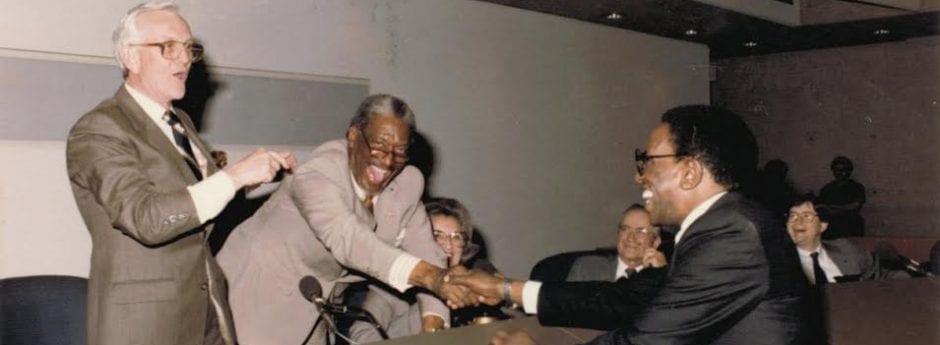Borstelmann, Thomas. The Cold War and the Color Line: American Race Relations in the Global Arena. Cambridge: Harvard University Press, 2001.
Broyles, Philip A. “The Impact of Shareholder Activism on Corporate Involvement in South Africa during the Reagan Era,” International Review of Modern Sociology, 28 no. 1 (Spring 1998): 7
Coker, Christopher. The United States and South Africa, 1968-1985: Constructive Engagement and Its Critics. Durham: Duke University Press, 1986.
Danaher, Kevin. The Political Economy of U.S. Policy toward South Africa. Boulder: Westview Press, 1985.
Davies, J. E. Constructive Engagement?: Chester Crocker & American Policy in South Africa, Namibia & Angola, 1981-8. Oxford: Ohio University Press, 2007.
———. “South African and Constructive Engagement: Lessons Learned?” Journal of South African Studies 34, no. 1 (March 2008): 5–19.
“Decisions On Divestment: The Position In May 1986.” Minerva 24, no. 2/3 (1986): 340-43. http://www.jstor.org/stable/41820654.
De Villiers, Les. In Sight of Surrender: The U.S. Sanctions Campaign Against South Africa, 1946-1993. Westport: Praeger Publishers, n.d.
Giddens, Sally. “The Selling of South Africa,” D Magazine, April 1987.
Gurney, Chirtable. “A Great Cause: The Origins of the Anti-Apartheid Movement, June 1959-March 1960.” Journal of South African Studies 26, no. 1 (2000): 123-144.
Heilig, Peggy, and Robert J. Mundt. Your Voice at City Hall: The Politics, Procedures and Policies of District Representation. Albany: State University of New York Press, 1984.
Hero, Alfred O., and John Barratt. The American People and South Africa: Publics, Elites, and Policymaking Processes. Lexington: Lexington Books, 1981.
Holston, Bill, Nancy Nichols, Alex Macon, Dawn McMullan, and Michael J. Mooney. “50 People Who Made Dallas.” D Magazine. November 1991. Accessed April 25, 2017.
John, Nerys. “The Campaign Against British Bank Involvement in Apartheid South Africa.” African Affairs 99, no. 396 (2000): 415-433.
Hipp, S. D. “Constructive Engagement: Ronald Reagan’s Problematic Policy of Appeasement with South Africa.” Master’s Thesis: Georgetown University, 2012.
“House overrides Reagan apartheid veto, Sep. 29, 1986,” http://www.politico.com/story/2010/09/house-overrides-reagan-apartheid-veto-sept-29-1986-042839.
Levy, Philip I. “Sanctions on South Africa: What Did They Do?” American Economic Review 89, no. 2 (1999): 415-420.
Litvak, Lawrence. “American Investment in South Africa.” In South Africa, Foreign Investment and Apartheid, by Lawrence Litvak, 43-67. Washington: Institute for Policy Studies, 1978.
Love, Janice. The U.S. Anti-Apartheid Movement: Local Activism in Global Politics. New York: Praeger, 1985.
Malone, David, and Susanna Goodin. “An Analysis of U.S. Disinvestment from South Africa: Unity, Rights, and Justice.” Journal of Business Ethics 16, no. 16 (1997): 1687-1703.
Mark, Hans. “The University Of Texas System.” Minerva 24, no. 2/3 (1986): 330-33. http://www.jstor.org/stable/41820652.
Mangaliso, Mzamo P. “South Africa: Corporate Social Responsibility and the Sullivan Principles.” Journal of Black Studies 28, no. 2 (November 1997): 219–38.
Massie, Robert. Loosing the Bonds: The United States and South Africa in the Apartheid Years. New York: Doubleday, 1997.
Minter, William, Gail Hovey, and Charles Cobb Jr., eds. No Easy Victories. Trenton: Africa World Press, 2008.
Minter, William and Sylvia Hill. “Anti-apartheid solidarity in United States-South Africa relations: From the margins to the mainstream,” The Road to Democracy in South Africa, Volume 3, International Solidarity, Part II.
Nesbitt, Francis Njubi. Race for Sanctions: African Americans Against Apartheid, 1946-1994. Bloomington: Indiana University Press, 2004.
Posnikoff, Judith F. “Disinvestment from South Africa: They Did Well by Doing Good.” Contemporary Economic Policy, January 1997, 76–86.
Razis, Vincent Victor. The American Connection: the Influence of United States Business on South Africa. London: Pinter, 1986.
Richardson, Henry J. “Reverend Leon Sullivan’s Principles, Race, and International Law: A Comment.” Temple International and Comparative Law 15, no. 1 (March 2001): 55–81.
Rottenberg, Simon. “The Universities and South Africa: The Campaign for Divestment.” Minerva 24, no. 2/3 (1986): 223-41. http://www.jstor.org/stable/41820642.
Schutze, Jim. The Accommodation: The Politics of Race in an American City. Secaucus: Citadel Press, 1986.
Soule, Sarah A. “The Student Divestment Movement in the United States and Tactical Diffusion: The Shantytown Protest.” Social Forces 75, no. 3 (1997): 855-882.
“The Politics of the Anti-Apartheid Movement in the United States, 1969-1986,” Political Science Quarterly, vol.111, no.1(1996):127.
Teoh, Siew Hong, Ivo Welch, and C. Paul Wazzan. “The Effect of Socially Activist Investment Policies on the Financial Markets: Evidence from the South African Boycott.” The Journal of Business 72, no. 1 (1999): 35-89.
The Road to Democracy in South Africa. Vol. 3. 6 vols. Pretoria: Unisa Press, 2008.
Thomson, Alex. “A Balancing Act: Key U.S. Interests and Apartheid South Africa.” In U.S. Foreign Policy towards Apartheid South Africa 1948-1994: conflict of interests, by Alex Thomson, 1-16. New York: Palgrave Macmillan, 2008.
Thomson, Alex. Incomplete Engagement: U.S. Foreign Policy Towards the Republic of South Africa, 1981-1988. Brookfield, Vt.: Avebury, 1996.
Voorhes, M. The U.S. Divestment Movement. How Sanctions Work,1999.
Williams, Roy H. and Kevin J. Shay, Time Change: An Alternative View of the History of Dallas. Dallas: To Be Publishing Co, 1991.
Williams, Roy H., Kevin J. Shay.“… And Justice for All”: The Untold History of Dallas: an Alternative Viewpoint. Fort Worth: CGS Communications, 1999.
